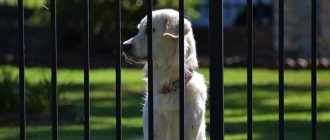- Dog in the Koran
- Hadiths Is it necessary to kill dogs according to Islam?
- Is it necessary to take ablution when touching a dog?
- Dishes for a dog to drink from
- A dog as a reason for entering Paradise
Conversations that Islam has formed a special attitude of Muslims towards animals such as dogs periodically either subside or flare up with renewed vigor, and most of them owe their appearance to the fact that few people have a more or less clear idea of what Islam talks about these animals. It should be immediately noted that according to Islam, it is forbidden for a Muslim believer to keep a dog, except for necessity.
Muslim attitude
In Islam, dogs are considered unclean animals. Contact between Muslims and these four-legged animals is not encouraged. Many Islamists explain their dislike for these creatures only because of this. The Koran describes a negative attitude towards any manifestations of cruelty. All animals are characterized as friendly to humans. Dogs are described as creatures that defile things, food, and their owner.
Islam
Any historian understands why Muslims do not like dogs. No matter how true Islamists feel about this fact, such obvious negativity is just a consequence of the long-forgotten enmity of two religions. At the very beginning of the development of Islam, Muslims did not distinguish dogs from other animals. A dog in Islam was an insignificant character: do not let it into the house, do not eat from the same plate, do not allow it to lick your hands - all prohibitions concerned only personal hygiene.
When Islam reached a certain development, severe oppression began, and then open hostility with the adherents of Zoroastrianism. In essence, it was a struggle for territory, a successful attempt to seize power. Today no one remembers why Muslims do not like dogs, but it all started with the persecution of these animals for the purpose of humiliation and demonstration of power. Followers of Zoroastrianism revered dogs and considered them vessels for the souls of their ancestors. What could offend an enemy more than humiliating and killing a dog? Islam has long and successfully supplanted Zoroastrianism, but due to tradition, some Muslims and dogs are still incompatible, like Jews and pork.
However, many modern Muslims do not share a negative attitude towards dogs. Today, more and more people are returning to the roots of religion, limiting communication with these animals only for reasons of purity - spiritual and physical. After all, the only reason why Muslims cannot touch dogs is because of the wickedness of these animals (according to historians, there is a misinterpretation or deliberate distortion of the term “ungodliness”, as is the case with “unclean” dogs in the Bible). Muftis openly condemn the negative attitude of Muslims towards dogs, recalling that the Koran prohibits hatred and cruelty to any animals.
Regarding the souls of animals, the opinions of Muslims and Orthodox Christians agree. As in Christianity, in Islam only the human soul is immortal, and only it deserves punishment or reward. The soul of a dog disappears after death, going neither to heaven nor to hell. An animal is not responsible for its actions either to Allah or to anyone else, since a dog (and any other animal) lacks self-awareness.
A little history
In many of the world's largest Muslim cities, dogs have long performed other important functions besides security - they ate food waste. From Damascus and Baghdad to Cairo and Istanbul, city governments have supported populations of these animals as waste consumers to keep city streets clean. Muslim leaders built water troughs for dogs, many mosques threw out food for them, and butchers used them to kill rats and other vermin.
People who committed violence against stray animals were often punished.
All this suggests that Muslims around the world lived peacefully with many dogs. They realized how useful four-legged animals were and developed relationships with them.
Negative attitudes towards dogs today
Given this history, why is the dog prohibited in Islam? Short answer: due to the spread of infections. About two hundred years ago, knowledge about infectious diseases began to change. People in the Middle East and Europe began to note the close connection between outbreaks of plague, cholera and malaria and the proximity of victims to places such as cemeteries, garbage heaps and marshy lakes. City planners and governments throughout the Middle East began removing these sources of disease from the increasingly crowded areas in which people lived. They threw garbage outside the city walls, and also unwittingly got rid of the dogs that ate this waste. There was no less waste in the cities, and the waste that remained was considered a threat to public hygiene.
Indeed, within just a few decades in the early nineteenth century, dogs came to be seen as economically worthless and a danger to public health. Results? Several large-scale eradication campaigns, far fewer animals in Middle Eastern cities, and a change in attitudes. And dogs are no longer useful, but dangerous, susceptible to disease and the spread of infections.
The fundamental principle of Islam is that everything is permissible except those things that have been expressly prohibited. Based on this, most Muslims would agree that it is permissible to have a dog for the purposes of safety, hunting, farming, or serving the disabled.
Many Muslims take a middle position regarding dogs, allowing them to exist nearby but insisting that animals occupy space away from the home and living quarters. Many keep the animal outdoors as much as possible and at least keep it out of areas where Muslims pray. For hygiene reasons, when a person comes into contact with dog saliva, washing the clothes is necessary.
Controversies ancient and modern
And they quote from this collection, which is a kind of guide for the followers of the prophet and is considered the source of Sharia - Islamic law. There actually is a saying of Imam Muslim, which talks about the need to wash dishes that a dog has licked several times.
Prejudice and common sense
Based on this saying, Islamic theologians came to the conclusion that dog saliva is an unclean substance, that is, “najis”. Some consider its fur to be unclean. Other religious leaders reduce everything to the ceremony of prayer, which an animal living in the house can disrupt with its touch, which will be a terrible sin.
The statements of the hadiths are quite contradictory. Consider, for example, the statement that angels do not enter a house where a dog lives next to people. In modern England, Muslim drivers kick blind people with guide dogs out of public transport for precisely this reason - they believe that then the angels guarding it will leave the car.
Sensible religious leaders oppose such prejudices, for then not even the angel of death would enter the house. And people would specifically keep them in order to live forever.
What the Koran says about dogs
The next popular prejudice among Muslims, which has become a proverb, is the assertion that devils and black dogs must be killed. But the main and sacred book of any Muslim, the Koran, does not contain any instructions on this matter. Quite the contrary, believers are instructed to show mercy to animals.
Photo: https://www.1zoom.ru/big2/449/275314-werecat.jpg
Muslims are not allowed to beat or harm animals; they will have to answer for such acts when the Day of Judgment comes. The Koran does not contain any direct prohibitions on their living in the same house with a person. Although a dog named Kitmir is present there in the “Cave” sura. This name became so famous and common that it was indicated on letters in order to protect them from loss.
Sunni Islam and the Shiite position on keeping animals
In the views of the classical Sunni branch of Islam, there are no direct prohibitions on keeping dogs. But authoritative imams al-Nawawiy and al-Shafi’i say that you can’t just have this animal in the house for pleasure. There must be practical use. For example, yard security or hunting.
In Shiite Islam there is more strictness in this regard. This may be due to the fact that today's Shiites are mainly residents of Iran. And in the history of this country, two religions competed for a long time. Zoroastrianism competed with Islam, whose followers valued them very highly.
Therefore, the ban on them became part of the fight against a competing religion, and calls to show cruelty to these pets are the sad consequences of human rivalry in the field of spirituality. To this day, calling a person a dog or comparing him out loud to this animal is a deadly insult.
A case in point is when an Islamic court sentenced a 70-year-old pensioner to 30 lashes just for walking his dog in a Muslim quarter of Tehran. And in the parliament of this country, a bill comes up from time to time that should outlaw these animals.
Arabian greyhounds
In the modern Muslim world, attitudes towards dogs will remain ambiguous. Few people dare to place this animal under their roof. But it is not considered dirty either. The famous hunting Arabian hounds are so highly valued that a well-trained one can cost tens or hundreds of thousands of dollars.
In the Arabian Peninsula, an old proverb is still in use, which says that a fast greyhound and a horse, together with a good falcon, are worth more than twenty wives. In ancient times, this breed was generally treated with reverence. The Arabian greyhounds were given luxurious clothes, and the hunters carried them in the saddle next to them and released them only when they saw the game.
Broken prohibitions
Muslims in other countries see nothing wrong with a dog taking its place as a pet. For example, the Kazan Tatars do not observe Islamic prohibitions. And in Azerbaijan, the number of animal lovers who consider their pets full members of the family is rapidly growing.
And the statement that they are unclean is interpreted completely differently. From a modern point of view, no one denies the theoretical possibility of infection from a sick pet with certain infections and helminthiasis. In particular, toxoplasmosis and brucellosis are transmitted to humans, and toxocariasis and echinococcosis are transmitted from helminthic infestations.
But this is not a sin, but a problem that can be completely solved by regular vaccinations and monitoring the pet by veterinarians. If hygiene rules are strictly followed, the risk of contracting something from a dog is practically zero.
Source
Quran about animals in Islam
Islam supports the rights of all living beings to be treated kindly and to be treated fairly. Animals should not be abused. In the Qur'an, all living beings are similar to humans and have similar rights. Killing without any reasonable cause or cruelty leads to serious sin and violation of the rights bestowed by Allah. People should be gentle with animals, even when they have to be disciplined.
Islam teaches us to be very careful in our behavior towards animals and all living beings, as there is great reward for treating them kindly and great punishment for violating their rights. People should treat animals well and not exceed the limits set by Allah.
About prohibitions in connection with the celebration of the New Year
Naturally, there are no direct prohibitions associated with the New Year either in the Holy Quran or in other sources. In the laws of Islam, everything is permissible as long as there are no instructions related to prohibition or obligation.
Interesting!
Naturally, there is absolutely no need to celebrate this holiday, but if we are talking about a ban, then there is no such thing either. In Islam, the New Year, as well as a number of other holidays, such as Victory Day in Russia or Independence Day in the USA, are treated equally.
All these days are external in relation to Islam. So is it possible or not for a Muslim to celebrate the New Year and why? Nobody forbids a Muslim to celebrate holidays like the New Year. The only condition is to avoid all prohibited points.
Believers in Allah should not drink alcoholic beverages or even be near those who are drinking them at that moment. Dancing between men and women who are strangers to each other is prohibited.
A Muslim cannot celebrate the New Year if the holiday is accompanied by drunkenness and wastefulness.
Attitude towards cats in Islam
The cat is a respected animal in Islam. They were loved by the Islamic prophet Muhammad. Cats are considered a typical Muslim pet. They have been revered since ancient times. According to many hadiths, Muhammad prohibited the persecution and killing of them. They delight with their purity and excessive affection. The roles of cats and dogs in Islam are completely opposite. It is believed that meowing creatures are ritually pure, unlike dogs, and therefore they are allowed to visit homes, mosques, including Masjid al-Haram. Food selected by cats is considered halal.
For what purpose are dogs allowed?
Why does Islam allow keeping these animals? Can Muslims have a dog? They are allowed to exist side by side with these animals only for the following purposes:
- hunting;
- livestock protection;
- protection of agricultural crops.
Keeping a dog at home as a pet is considered haram (forbidden acts) in Islam.
Why are Muslims afraid and dislike dogs?
Muslims are afraid of dogs, but they love cats. Muslims are not afraid of dogs, they just stay away, they don't like them. Fear manifests itself precisely when there is a threat of close contact with an animal, which cannot be prevented. Dogs located near the mosque are especially wary. Because a dog can come inside and interfere with prayer. The same goes for home. If the dog is in the home, then it is unacceptable to pray. Such housing is considered desecrated, since the animal can grab things with its teeth or lick objects in the house, droplets of saliva remain on them.
Regarding dogs, it is even forbidden to hang a picture of these animals in a Muslim home. Some believers still experience fear of dogs; it occurs at the subconscious level, instinctively. Disgust plays a huge role in the dislike of such four-legged creatures, especially towards a wet animal - this defiles the ritual purity of Muslims.
The role of the prophet Muhammad in relation to dogs
Muhammad made harsh statements about dogs, and these remarks affected the animals in tragic ways. His teachings may have come from cultural bias, pagan concepts, or his own imagination, but wherever they came from, they led to cruel treatment. None of the negative statements about dogs are found in the Qur'an, but they abound in various collections of traditions (hadith). They are the basis of Islamic theology and many Islamic laws. Hadiths describe dogs as unclean and instill a negative attitude towards these animals among Muslim believers.
Muhammad claimed to be the prophet of Allah, and therefore his instructions were listened to and followed adamantly.
“Unclean” is not possible or is it still possible?
Such prejudices about dogs arose due to different historical points of view on these animals. Some historical sources claim that the Prophet Muhammad himself performed daily prayers directly in the presence of dogs. Similar sources also claim that his followers commonly bred puppies and that dogs often lived in the holy city. However, there are also beliefs that contradict these statements.
One of the hadiths (colloquial and practical lessons of the Prophet Muhammad) states that Muhammad himself considered dogs to be “unclean”, and therefore it is believed that the Quran is forbidden to even touch an animal, let alone have one in the home. This statement, as it turns out, is only partially true.
According to an article written by veterinary surgeon and Muslim Ayub Banderker, there are several considerations in Islamic law regarding dogs and prohibitions that may well be misinterpreted.
He addresses Muslims in his article to dispel several myths regarding the Quran and dogs. “Every animal was created for a specific purpose. Every person is obliged to respect the creation of Allah. If we mistreat any of His creations, we will be questioned about it on the Day of Judgment.”
In fact, here is what is prohibited and allowed:
- The dog is not prohibited, although keeping it in the house is not hygienic.
- There is no prohibition against touching this or any other animal. But if dog saliva touches you or any part of your clothing, then you need to wash that part of the body and the item of clothing.
- All Muslims who own dogs, whether for agricultural purposes or as pets, are required to provide them with adequate shelter, food, water and, if necessary, veterinary care. If someone is going to go away from home for some time, then he should make sure that his dog remains under supervision.
- It is prohibited to keep a dog or any other animal on a short leash for a long time without food, water and shelter. Dogs need exercise, walks and are social creatures. Therefore, owners should spend time with their pets every day.
- It is cruel and therefore prohibited to keep any animal in a cage so small that it cannot behave naturally.
- Fireworks are prohibited in close proximity to animals, as they cause untold suffering to most animals due to their acute hearing.
- Participation in any blood “sport” such as dog fighting and trophy hunting is prohibited.
Is it possible to touch a dog?
According to Islam, Muslims who come into contact with this animal are required to perform ablution 7 times. You cannot perform namaz or pray in clothes that have come into contact with an animal. This ruling comes from the hadith: “The Prophet said: “If a dog licks a vessel, let the person throw away everything that is in it, and he must wash it seven times, once with soil.” It should be noted that one of the basic Islamic thoughts indicates that this is not a matter of ritual purity, but simply a common sense method to prevent the spread of disease.
Islamic morality in nutrition
If a Muslim man or woman strives for proper spiritual development, then they must understand that this process is based on purifying their mind and their body. Killing an animal for excessive food is not encouraged in Islam. Moderate consumption of meat has a beneficial effect not only on a person’s physical condition, but also on his mental health, the development of ethics and morality in his personality.
Muslims do not eat a lot of food, in Islam it is customary to eat food in order to satisfy the body's needs, and excessive consumption of food that causes obesity or excess weight is not encouraged. On the contrary, reduction and restriction in nutrition is the norm and comes from the sunnah of the Prophet Muhammad ﷺ, in addition to the obligatory monthly fasting in the month of Ramadan for Muslims, according to the sunnah of the Messenger of Allah ﷺ, it is recommended to fast 2 times a week (on Mondays and Thursdays), as well as 3 days in middle of the lunar month. There are also additional fasts throughout the year, such as 6 days of fasting in the month of Shawwal after Ramadan, 10 days of fasting in the month of Dhul-Hijjah.
Hadiths about dogs
There are several hadiths that warn of consequences for animal owners:
- “Whoever keeps a dog, his good deeds will decrease every day by one kearaat (unit of measurement), only if it is not a dog for farming or cattle breeding.”
- “Angels will not enter a house where there is a dog or a picture of animals.”
- Other hadiths tell us that if we touch a dog, our ablution is invalid and we become unclean, and we need to wash ourselves seven times to cleanse this dirt, the eighth time with earth.
This seems inconsistent with the Qur'an, which says that you can eat what these animals catch in the hunt. It is also specifically mentioned that any prey caught by hunting dogs can be eaten without any need for further cleaning. Naturally, the kill of a game animal comes into contact with saliva, and this does not make the meat unclean.
Reasons why Tatars consider dogs “unclean” animals
For a long time, pagans endowed animals with special divinity and believed that they could see more than people. However, with the advent of other religions, many superstitions related to animals appeared. One of these superstitions is the belief of Muslims, and especially the Tatars who profess this religion, that dogs are an “unclean” animal.
It is also interesting that this worldview among the Tatars, associated with dogs, has several explanations. First of all, this is, of course, the Muslim faith, according to which it is believed that a dog is an “unclean” animal, since it is a harbinger of imminent death.
Based on the Muslim faith, an angel can never enter a house where dogs are kept. That is why, despite the fact that religion no longer has such a huge influence, Tatars nevertheless continue to beware of dogs and do not allow them into their house or apartment. Moreover, a big problem for them is that the dog can lick the plate. Indeed, in this case, this plate needs to be washed seven times in a row, and then wiped with earth. Otherwise, serious problems may await them.
Since in pagan beliefs it was customary to tell fortunes by the howling of a dog, in the Middle Ages it was decided to kill dogs. This was especially true for black dogs, as they were considered servants of the devil. However, over time, this decision was changed, and dogs began to be kept to protect the sheep.
Another prohibition is related to paganism. According to long-standing beliefs, dogs can see the angel of death, which is why they howl, announcing the imminent death of one of the inhabitants of the house. Many Slavic peoples had the same opinion, who considered a dog’s howling to be a harbinger of some kind of grief.
Despite this, the ancestors of the Tatars, the Bulgars, were not so critical of the howling of dogs. Moreover, for them it was a good sign, since the howl of a dog foreshadowed a fruitful and successful year. And for girls, the howling of a dog was a good harbinger. For example, if during winter fortune-telling you put your ear to the ground and heard a dog howl, this meant that the girl would have a good groom, and it was time for her to prepare for marriage.
After conducting an analysis among various religions, historians came to the conclusion that this attitude towards dogs was mixed with superstitions. But a bad attitude towards dogs appeared only during the birth of Islam and Judaism, due to the fact that dogs were faithful friends of the pagans and took part in many rituals.
Hadiths about black dogs
Some hadiths even go beyond understanding, saying that black dogs in Islam are considered evil (literally described as ferocious creatures possessed by the devil), and calling for the killing of all animals of this color. When interpreting this hadith in a modern way, you should not take everything literally. It gives insight into why the prophet ordered the killing of dogs. This must be due to the excess of stray animals and, consequently, the danger of rabies in the city of Medina and its suburbs. That is why the prophet called for their destruction. It was discovered that his companions were exterminating everyone indiscriminately. He discouraged it and forbade them to do it. They were told that they could only kill cruel animals that were a source of danger to life. There is no direct call to violence in the Koran.
Exception for greyhounds
There is an exception breed in the dog family, which is not only tolerated by Muslims, but also loved - greyhounds. They are groomed and cherished in every possible way, sewn clothes and fed with delicacies.
The love for greyhounds has its origins in the countries of the East, where there is a legend about how the first representative appeared. It says that King Solomon, for the dog’s willingness to serve him, decided to reward the animal with beauty and stroked its muzzle until it became sharp.
Touched by the dog’s obedience, the Prophet said that he and the horse would accompany a person to paradise and appear second before Allah.
The Prophet bequeathed not to have dogs unless necessary, with the exception of greyhounds
Not hatred, but lack of knowledge
In many countries, dogs are not generally kept as pets. For some people, their only contact is with stray animals in packs wandering the streets or countryside. People who don't grow up around friendly dogs may have a natural fear. They are not familiar with dog behavior, so an animal that runs towards them is perceived as aggressive. Many Muslims who seem to “hate” dogs are simply afraid of them due to ignorance. They may make excuses (“I have allergies”) or emphasize the religious impurity of these animals simply to avoid interacting with them.
What is unacceptable in relation to dogs in Islam
- Dogs are prohibited as pets in Islam. In fact, if a Muslim keeps one as a pet, Allah will take away some heavenly reward for good deeds.
- Eat the meat of this animal.
- Enter the mosque. This hadith states that if a dog passes in front of people who are praying, it will invalidate their prayer. Nullifies means "reduces to nothing" or "makes ineffective or inoperable." If a group of people are praying and a dog walks among them in Mecca, then their prayer becomes invalid.
- Live in the same house. The main reason: dogs carry numerous microbes. The second reason is more of a religious nature - they do not allow angels to enter your home.
- If a dog touches the robe, you cannot begin prayer in these clothes; they must be washed and cleaned of hair.
- You cannot buy or sell a dog. Muhammad believed that money received from sale was considered "evil", like money received from prostitution, witchcraft or usury.
Are cats dirty animals?
Cats in Islam are pure animals. According to Kabshi bint Ka'b ibn Malik, when Abu Qatada, her husband's father, came to her, she poured water so that he could perform ablution. A cat approached this water for ablution and began to drink this water, and then Abu Qatada tilted the vessel with water so that it would be more convenient for her to drink the water. To Kabshi's surprised look, he said that cats are not unclean: “They are one of those who walk around you.”
During the time when the Prophet Muhammad ﷺ lived, cats were not prohibited from moving freely among people, they could freely enter houses, and the Prophet Muhammad ﷺ did not say that they were najas.
The question about cats was also asked to Anas ibn Malik, and he related an incident when, together with the Prophet Muhammad ﷺ, he went to Batkhan, and the Messenger of Allah ﷺ told him to prepare water for performing ablution. After the Prophet Muhammad ﷺ approached the vessel in which water for ablution was prepared, he saw that a cat was drinking from this vessel. Then the Prophet Muhammad ﷺ began to wait until she finished drinking the water. After this, Anas ibn Malik asked the Prophet Muhammad ﷺ if he should replace the water for ablution since the cat drank from it, but the Messenger of Allah ﷺ replied: “Oh, Anas, cats are clean and they never pollute anything” (Tabarani, isnad of the hadith weak).
Regarding cats, Muslims periodically have questions of a religious and legal nature regarding the presence of cat fur on a person’s clothing while he is saying prayers at home or in a mosque. According to Islam, will a prayer be accepted from a person whose ritual purity is violated by cat hair on his clothes, even if he is not in the mosque? To answer this question, they cite the words of Abu Qatada, who told his daughter-in-law that a cat is a pure animal - these words are given in an authentic hadith transmitted by Abu Dawood, At-Tirmidhi, an-Nasai and others. According to At-Tirmidhi, this hadith is reliable, and the opinion of many Islamic scholars regarding the presence of cat hair on clothing is based on it.
An-Sanani believed that by the fact that the Prophet Muhammad ﷺ called the cat a pure animal, he saved Muslims in his ummah from many difficulties, since it constantly conducts its life activities next to a person, lives in a house, therefore the fact that Allah Almighty created such an animal , like a cat, removed from impurities and najas is a great relief for a person. In Subulu-s-salaam there is a hadith that mentions why the Almighty made the cat removed from pollution: a cat among people is like a servant - it is always present among people, it is very attached to the household. Since the remains of the water that a cat drank are considered clean, then the cat’s fur is considered even more clean, because, according to Ibn Qudam, the cleanliness of an animal, its skin, wool, sweat, hair can be judged by whether the water in which there is the remains of his saliva. This was reported in Al-Mughni.
According to Shaykh al-Islam Ibn Taymiyyah, the hair of all animals, both those whose meat can be eaten as food and others, is clean. The same applies to all types of hair, down, feathers and wool, regardless of whether the animal is alive or dead. He said that hair, in terms of its life processes, can be compared to plants, since hair, like them, grows and feeds, but it does not have feelings, and it does not move of its own free will. And until the hair leaves the animal, it does not belong to it.
Modern Muslims
In the modern world, you can find Muslims living side by side with a dog. More and more people are realizing and seeing the benefits of keeping such an animal at home. Here are some reasons why some followers of Islam keep a dog at home:
- Regular walking helps lower blood pressure;
- playing with a dog improves your mood;
- large breed dogs give a feeling of security and provide reliable protection for the owner and property;
- help in recovery from serious illnesses such as heart attacks.
Owning a pet is a huge responsibility that Muslims will have to answer for on Judgment Day. Those who choose to own a dog must be aware of all the responsibilities that are assigned to them. They must provide the animals with food, shelter, training, exercise and medical care. However, most Muslims recognize that pets are not members of the family, and they have no desire to provide the four-legged animals with proper conditions.
A little about Muslim scriptures
The main book, which can be called the bible for Muslims - the Koran, does not have any records that dogs are dirty animals. On the contrary, one part of the scripture contains an entire chapter that talks about a dog named Kitmir.
In addition, the Koran does not call for killing or cruelty to animals and notes that every true Muslim must be kind and pure in intentions, because on the Day of Judgment he will answer for all the evil he has done.
However, Islam has several interpretations, including Shiite. Adherents of this Muslim movement refer to the scriptures about the lifetime actions of the Prophet Muhammad.
Here the words of Imam Muslim are noted that the dishes after the dog should be washed several times.
These words were taken by some Muslims as a call to action. Therefore, dog saliva and fur are considered unclean. Some clergy generally consider the touch of a pet to household items a bad sign, and the touch of a person to a dog as a terrible sin.











